Quincy Addiction Treatment & Mental Health Resources Guide

Dr. Rostislav Ignatov, MD
Chief Medical Officer
With overdose deaths climbing 16% in 2023, Quincy faces an escalating behavioral health crisis. At the same time, treatment access and recovery resources continue to expand. This guide brings together the numbers, services, and supports that shape care in Quincy today.
Quincy faces a complex addiction crisis, with overdose deaths reaching a record high of 51 in 2023—a 16% increase from the previous year. At the same time, the city maintains a strong recovery network, including mobile crisis teams, residential programs, peer support groups, and culturally competent mental health services.
Despite these resources, Quincy continues to face treatment gaps. Engagement in formal treatment varies across neighborhoods, and some residents still experience longer wait times for specialized care. The Massachusetts Behavioral Health Partnership ensures MassHealth coverage for comprehensive treatment, while local organizations provide crisis stabilization services to residents who need immediate support without hospitalization.
This comprehensive guide outlines how to access addiction, mental health, and recovery services in Quincy, helping residents navigate a complex but resilient treatment system.
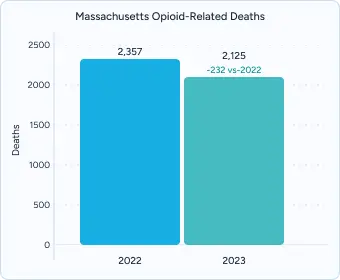
Fatal overdoses rose 16% in Quincy last year, marking the highest level since tracking began and reversing earlier stabilization efforts. By comparison, Massachusetts overall reported 2,125 confirmed and estimated opioid-related deaths in 2023—232 fewer than in 2022—showing the city trending worse while the state improved.
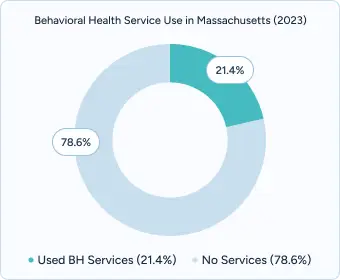
Demand for care continues to grow statewide. More than one in five residents received behavioral health services last year, while many hospital emergency departments reported “boarding,” with patients in crisis held more than 12 hours awaiting placement.
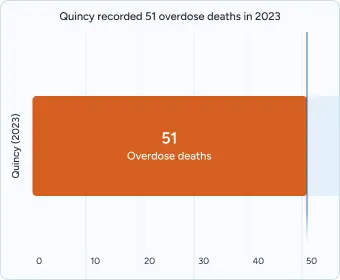
While Quincy recorded 51 overdose deaths in 2023, statewide more than one in five residents used behavioral health services during that same year. This shows that while emergency stabilization remains common, demand for long-term treatment engagement is widespread across Massachusetts.
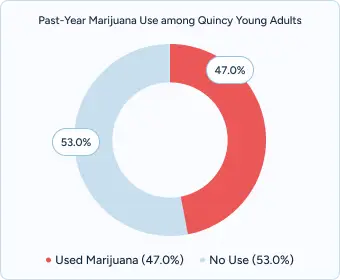
Substance use among youth in Quincy remains a major concern, particularly among college students, unemployed young adults, and those facing housing instability. Less than half of those who struggle receive adequate support, underscoring a widening youth mental health crisis.
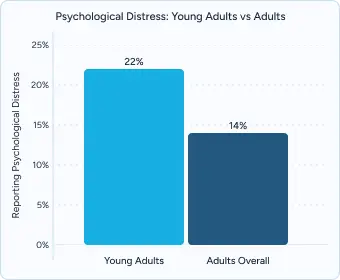
Statewide data show young adults report much higher levels of persistent poor mental health compared to older age groups. In Quincy, transitional-age youth, students, and residents with co-occurring conditions face some of the steepest barriers to accessing care, with nearly 9% of families and 5% of individuals reporting unmet behavioral health needs due to cost.
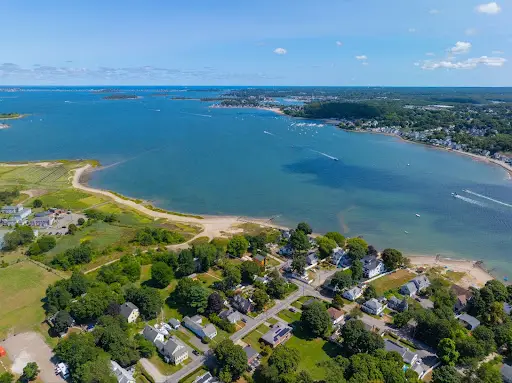
The Mobile Crisis Intervention Team provides 24/7 crisis intervention, covering Quincy, Braintree, Milton, Randolph, and Weymouth. With locations at 460 Quincy Avenue and satellite offices, it offers psychiatric evaluation, crisis stabilization, and intensive community support through both residential (5-bed unit) and mobile teams.
Transportation accessibility through MBTA services links all neighborhoods to Quincy drug rehab programs and mental health facilities. The Red Line provides access via North Quincy, Wollaston, Quincy Center, and Quincy Adams stations. Red Line stations and multiple bus routes connect Quincy neighborhoods to treatment hubs, while The RIDE paratransit service supports individuals with disabilities.
Covers 100% of treatment costs for qualified residents, including medical detox, residential treatment, outpatient therapy, and approved medications like buprenorphine and naltrexone. As of 2024, copayments have been eliminated for most services, extending coverage to residents up to 400% of federal poverty level.
MassHealth Standard and CarePlus offer coverage for eligible children and adults, ensuring access to crisis services and ongoing support. Residents can enroll via the Massachusetts Health Connector online portal or by calling 800-841-2900, with applications available in Spanish, Portuguese, and other languages.
Massachusetts Behavioral Health Partnership (MBHP) provides state-funded financial assistance for individuals not eligible for MassHealth, up to 400% of federal poverty level. Apply through the Department of Public Health regional offices or online, with support materials in multiple languages.
Quincy Health Access Navigator Program offers wraparound funding and navigation services for uninsured residents. Visit the Bay State Community Services website or call 617-471-8400 to find public treatment slots and support resources across community agencies.
For those seeking private care without long wait times, several facilities in Massachusetts—including options serving the Quincy area—offer direct admission with insurance verification. These centers typically provide comprehensive assessment, medical detox when needed, and evidence-based treatment approaches such as cognitive-behavioral therapy, dialectical behavior therapy, trauma-focused therapies, and medication-assisted treatment. Many also integrate holistic modalities like yoga, reiki, and art therapy.
Private facilities may offer certain advantages over state-funded programs, including:
The Haven Detox – New England in Worcester is one such facility serving residents across Massachusetts, including the Quincy area. The center combines clinical therapies like CBT and DBT with holistic services, and utilizes GeneSight genetic testing to help personalize medication choices. With a high staff-to-client ratio, the facility provides both medical detox and residential treatment in a resort-like setting that includes a professional chef, gym, pickleball court, and beauty salon.
The program treats co-occurring mental health and substance use disorders, accepts most major insurance plans including MassHealth, and provides transportation assistance throughout Massachusetts and neighboring states.
Mental health services across Quincy encompass depression treatment, anxiety care, and dual-diagnosis support throughout North Quincy, Quincy Center, and Wollaston neighborhoods. Programs feature culturally competent care with bilingual providers, trauma-informed approaches, and specialized services for diverse populations including LGBTQ+ individuals and veterans.
Quincy Recovery Connection Center provides free peer-led groups, recovery coaching, and social support for residents navigating early recovery or building sober networks. The center is open daily with drop-in hours and bilingual staff available to reduce access barriers.
A New Way Peer Recovery Support Center in Quincy offers mutual aid meetings, family workshops, and peer coaching in a welcoming, community-based environment. With evening and weekend hours, it helps residents stay engaged in recovery outside of clinical settings.
Quincy residents have access to free, peer-led recovery programs that provide safe, supportive spaces outside of formal treatment. These centers focus on building community, promoting wellness, and offering peer mentorship.
Quincy residents can find safe, structured recovery housing through homes certified by the Massachusetts Alliance for Sober Housing (MASH). Certification ensures that sober homes meet statewide standards for accountability, safety, and peer support. These residences typically include:
Families and residents can explore the MASH online directory to find certified homes across Quincy and the South Shore.
Quincy and the South Shore offer a wide range of free, community-led recovery meetings:
Effective care should begin with a comprehensive assessment that evaluates both substance use and mental health needs. Because co-occurring disorders like depression, anxiety, and trauma are common in Quincy, programs that integrate dual-diagnosis treatment and involve families in the process are often better equipped to support long-term recovery.
MAT is another marker of quality. Programs that offer FDA-approved medications like buprenorphine (Suboxone), naltrexone (Vivitrol), or methadone—combined with counseling and behavioral therapies—can reduce relapse risk and improve outcomes.
These services also make a difference by addressing the whole person, not just the diagnosis.
Finding the appropriate program requires matching providers to client backgrounds including bilingual staff, LGBTQ+-affirming programming, and faith-based support options. Seek programs serving diverse communities including Latino/Hispanic and Asian populations prominent in Quincy.
Aftercare Coordination should begin during active treatment, connecting clients with outpatient therapy, peer recovery groups, and sober living arrangements through warm handoffs. Effective programs maintain partnerships with community organizations for ongoing support services.
Family Engagement and Support improves treatment outcomes by involving loved ones through multi-family therapy sessions and educational workshops. Many programs offer culturally tailored family services in multiple languages to serve Quincy’s diverse population.
Professional treatment offers access to expert care and a level of safety and support that is difficult to achieve outside a clinical setting. Licensed clinicians, medical providers, and trained staff bring the experience needed to manage both the medical and emotional challenges of recovery while creating an environment that supports long-term healing.
Trauma-Informed Care utilizes Evidence-Based Trauma Therapy approaches including EMDR and cognitive processing therapy, with specialized training required for all clinical staff providing trauma services.
Alumni Recovery Networks support long-term sobriety through quarterly virtual reunions and peer mentorship programs, maintaining connections between graduates and current clients through digital support platforms.
Benefits Navigation Services provide insurance advocacy and sliding-scale consultation assistance, employing dedicated financial coordinators and community resource specialists to ensure treatment accessibility.
Professional treatment represents an investment in recovery success, offering immediate access, personalized care, and comprehensive services designed to address the complex nature of addiction and mental health conditions.
Recovery doesn’t have to wait. With professional support available 24/7, you can begin the process as soon as you’re ready.
Our team reviews benefits within 24–48 hours, providing clear cost estimates and helping with prior authorizations or appeals when needed. Financial advocates work directly with your insurance provider so you can focus on treatment, not paperwork.
Assessment and intake services include same-day psychiatric evaluations and next-day placement when beds are available. Staff guide you through each step of the process, minimizing delays and ensuring immediate access to safe, professional care.
Most programs schedule an initial assessment within 48 hours, then connect you with a therapist based on your needs and insurance coverage.
MassHealth typically covers individual and group therapy at 100% with no copayments for qualifying members; verify your specific plan benefits.
Yes. Many community centers offer Spanish-language AA/NA meetings, with interpreters available for other languages through mobile crisis services.
Several programs provide sliding-scale fees and state-funded treatment; contact Aspire Health Alliance or Bay State Community Services for uninsured options.
MBTA provides accessible public transit, while some programs offer ride vouchers or coordinate with The RIDE paratransit service for individuals with disabilities.
Multiple 24/7 crisis lines operate including 833-773-2445 for behavioral health, 877-382-1609 for mobile crisis response, and 988 for suicide prevention.
Yes. Family support specialists offer confidential coaching through Al-Anon meetings, family therapy programs, and intervention planning services.
Look for LGBTQ+-affirming groups at Women of Worth meetings, culturally responsive Latino services, and faith-based support tailored to diverse community needs.
24/7 Support
No Commitment
100% Private
There’s no catch. Checking your insurance is simply a way to see what your plan covers — it doesn’t lock you into treatment, notify anyone, or cost you anything. You get answers upfront to decide what makes sense for you.
Protecting your privacy matters! No information or notifications are ever sent to your employer or family — whether you check your insurance online or call. Everything is handled through secure, encrypted systems that meet strict medical privacy laws. You stay in control of your information!
Luckily, most insurance policies cover treatment here. Depending on the healthcare you’ve already had this year, costs could even be zero. Instead of worrying, let’s just find out what your plan covers.
Most likely. We work with major providers like Cigna, Aetna, and United Healthcare, public insurances like Tricare and tribal plans, and even smaller plans like Surest Bind and Harvard Pilgrim. The quickest way to know for sure is to check online or call. It’s a quick, private way to understand what is covered upfront.
Verifying your insurance isn’t a commitment to start treatment — it’s simply a way to see what your options are. Knowing your coverage ahead of time helps you make more informed, confident decisions. It also helps flag a spot, so you’re able to get right in if you ever do decide you’re ready.
You need your policy number to check your specific policy online. If you want general information, just call. You likely have questions beyond insurance anyway. Reaching out now helps you figure out the right fit if or when you’re ready. You don’t have to put off the call until you’re in crisis. Calling is not scary, I promise!